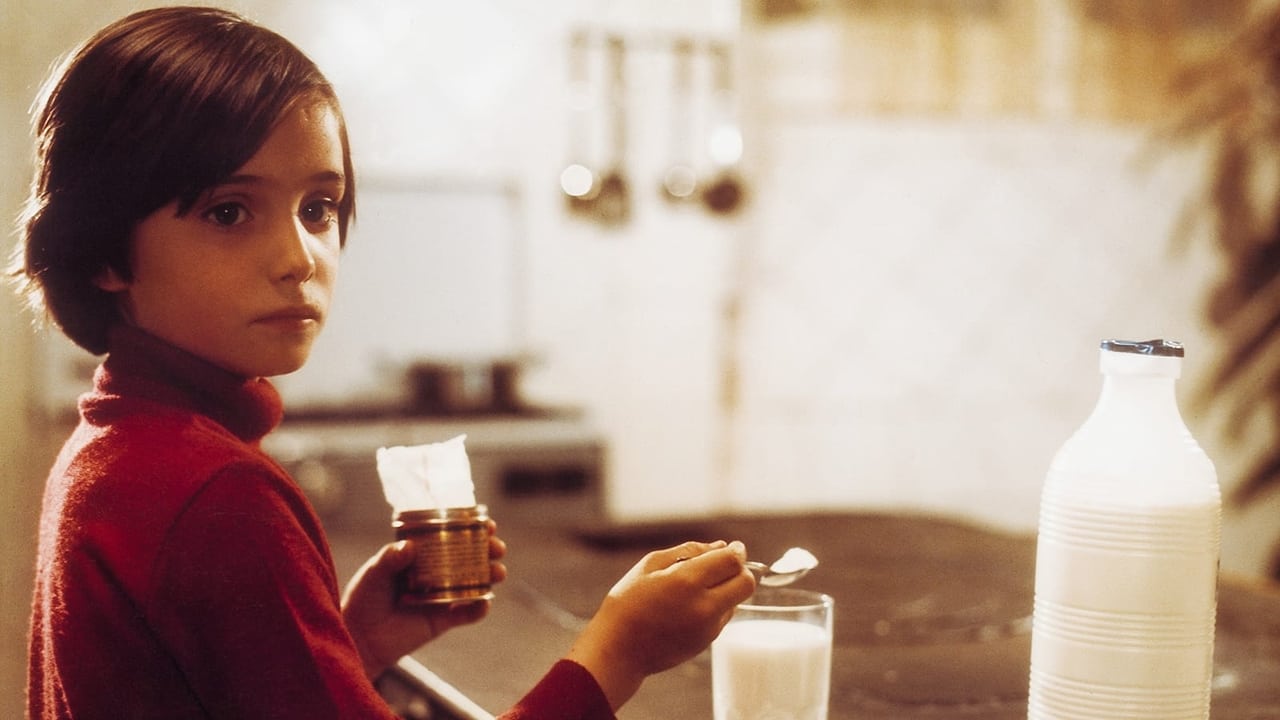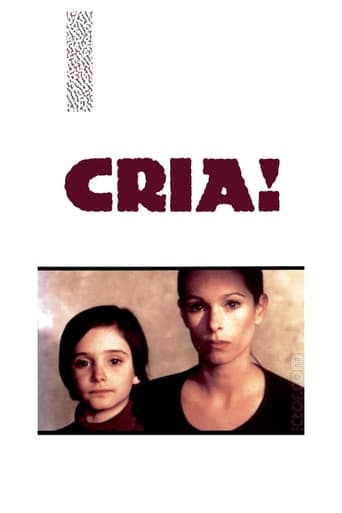

The film makes a home in your brain and the only cure is to see it again.
... View MoreThe movie turns out to be a little better than the average. Starting from a romantic formula often seen in the cinema, it ends in the most predictable (and somewhat bland) way.
... View MoreThe movie turns out to be a little better than the average. Starting from a romantic formula often seen in the cinema, it ends in the most predictable (and somewhat bland) way.
... View MoreStory: It's very simple but honestly that is fine.
... View MoreAna (Ana Torrent), a sad-eyed little girl of about eight years old, unable to sleep, overhears a conversation as she walks down the stairs to get a glass of water. The voices, coming from her father Anslemo's (Hector Alterio), room, are exchanging expressions of mutual love. Ana hears the gasp of a man's voice crying that he is suffocating and then silence. A woman that she recognizes as Amelia (Mirta Miller), the wife of army officer Nicolás (Germán Cobos), her father's best friend, hurriedly leaves the room and heads for the front door, her blouse still unbuttoned. When the girl goes into her father's room, he is dead. She calmly takes the almost-emptied glass of milk next to his bed and washes it in the sink, then carefully puts it back on the kitchen rack.It's title derived from the Spanish proverb "Raise ravens and they'll take your eyes," Carlo's Saura's haunting Cria Cuervos is a masterful insight into the mind of a little girl traumatized by the death of both of her parents. We see events from Ana's perspective and its fragmented view of an imaginative but angry and resentful child is a mixture of fantasy and reality that is often hard to separate. The film is also seen by some as an allegory for the mindset of the dying days of the Franco dictatorship. Whether it is viewed as a political statement or not, Cria Cuervos' evocation of the painful memories of a child whose grasp on reality is fading is masterful and deeply moving, especially given Ana Torrent's heartfelt and authentic performance.Ana is one of three sisters. The older one is Irene (Conchita Pérez) and the younger one is Maite (Maite Sanchez). The little girl has visions of her mother talking to her, giving her advice about staying up too late, and reading stories to her in bed. Ana deeply longs for her mother (Geraldine Chaplin) who died of a painful illness before her father passed away. In voice-over we hear the adult Ana (also played somewhat confusingly by Geraldine Chaplin) recalling her memories from childhood and she has little good to say about them, saying that she remembers it being "interminably long and sad, full of fear." The children are now under the care and protection of their Aunt Paulina (Mónica Randall), who lacks warmth and affinity, and some have compared her haughty nature to the authoritarianism of the Franco government.As a result, the children are much closer to Rosa, the family maid, who talks to them about family secrets even though much of what she says goes over their head. Also living with them in their country estate is the girls' grandmother, disabled and unable to speak who loves to look at family pictures on the wall, trying to recapture her fading memories of the past. The girls play at being adults. Irene puts on her aunt's bra and does her lashes. Pretending to be her father, Irene draws a moustache on her face while Maite wears high heels. Ana puts on lipstick as they act out their version of memories recalled from the many arguments they heard between their unfaithful father and their depressed and anxious mother.The motif of death runs throughout the film. Ana believes she poisoned her father and fantasizes about also killing her aunt. She even mixes some baking soda in her aunt's milk, thinking it is poison. In one sequence, Ana looks down a busy Madrid street from her roof and pictures herself jumping to her death. The children also play hide-and-seek in which the one whose hiding place is discovered has to pretend to die and remain "dead" until Ana offers a prayer to her guardian angel to "revive my sisters." Although we are somewhat buoyed by the scene of the end of the summer with the girls going back to school, we are left to wonder whether the family's cynicism and negativity will carry over into the children's adult life. The adult Ana's voice-over, heard without any context, is not promising.
... View MoreA quietly brilliant film, Cría cuervos is a touching and funny but profoundly serious meditation on the end of the Franco era. Clearly there is a wealth of material in the basic metaphor of children growing up around dysfunctional and disingenuous parents. Carlos Saura goes out of his way to make a more ambivalent film though. The children are not on the cup of adolescence but buried in the depth of childhood - the only conventional passage is that of the denouement which shows the girls on the way back to school. Within the film there is all manner of quietly teased-out misdirection and surrealism: the constant overlay of Ana the child and woman, and the same with her mother, dead and alive; a child's plain-faced obsession with death, which, simultaneously, she fails to really understand; a plate of chicken's claws, ominously preserved in a fridge.So there's the meditative oddity of Jodorowsky but also the child's eye perspective of Bergman (Fanny and Alexander was yet to be made though). I think the most affecting thing may be the mono-pace of the camera and editing, which never rushes to artificially stimulate the drama. That's left to the story as seen and told by Ana. Ana Torrent, in this role, is fairly miraculous, composed but engaged in almost every frame, usually in close-up. Geraldine Chaplin is also wonderful as the mother/older Ana, maintaining the opaque gaze of a Spanish woman at the heart of the injustices of Franco's warped society. An economical, uncomplicated, poetic film of lasting power. 8/10
... View MoreWith this and "Spirit of the Beehive", Ana Torrent is the poster child for childhood in cinema. Not as compelling as "...Beehive", but infinitely fascinating in it's own right, "Cria Cuervos" explores a sad and lonely childhood landscape. One of death and oppression, which leaves many deep scars and a little hope. Depending on how much you know about Franco and Spain, you'll see come political undertones, particularly with scenes of oppression within this disintegrating family. I recognized the stuff but I'm not familiar enough with that era to pinpoint who, what why. It seemed fairly general though and beside the point in a lot of ways.Torrent plays Ana, a middle child. Her mother has recently died of a long drawn out unexplained illness, and now - apparently - under her own hand, for she blames him for her mother's death, her father passes, leaving the girls in the charge of a strict, uppity but well meaning aunt. Ana is obsessed with death, sees it as a way to get rid of people she doesn't want around, and also to help. But as most children of about 8 she does not fully understand the qualities of it.Through memories and fantasies, the mother played by Geraldine Chaplin - director Carlos Saura's muse - and the father return, acting out the missing pieces of this family. Some of it is a bit melodramatic and tired, and when the movie shifts away from the children - which does not happen often and usually briefly - it is far less engaging.The film has an ethereal eroticism and sensuality to it. The mother is very flirtatious in the way she asks Ana for kisses. And in particular the dance scene between the sisters holds this disturbing but natural desire to become adults in the way the girls dance together. To hate yet desire growing up.
... View MoreIn Madrid, the orphan sisters Irene (Conchota Pérez), Ana (Ana Torrent) and Maite (Maite Sánchez) are raised by their austere aunt Paulina (Mônica Randall) together with their mute and crippled grandmother after the death of their mother (Geraldine Chaplin) and their military father Anselmo (Héctor Alterio). Ana is a melancholic girl, fascinated by death, after seeing her mother having a painful death and her father dead in bed."Cria Cuervos" is a beautiful and sad movie of Carlos Saura that can be watched in two levels: in the first plane, it is a film that recalls the style of the family dramas of Ingmar Bergman. However, in a deeper level, the story is actually a metaphor of the recent Spanish political history, and each character represents a segment of their society: Ana's father represents the military dictatorship of Franco; her dying mother, the republic; her grandmother, those who miss the republic; Ana is probably the youth with a sad childhood surrounded by deaths. The conclusion is a message of hope for the people. I believe that those familiarized with the Spanish history would find many other elements, but in both levels this movie is wonderful. The title is a reference to the Spanish proverb "Cría cuervos y te sacaran los ojos" which means "Raise the ravens, and they will remove your eyes". Ana Torrent shows her amazing talent in the beginning of her successful career. My vote is eight.Title (Brazil): "Cría Cuervos " ("Raise Ravens ")
... View More